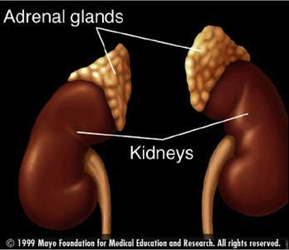


Moffitt Cancer Center features an Endocrine Program with physicians who focus exclusively on evaluating and treating endocrine malignancies like adrenal cancer. A benign nodule may be surgically removed to help relieve side effects, although some patients are able to control their symptoms with medications. Chemotherapy and radiation therapy may also be administered to help destroy cancer cells. If a nodule is believed to be malignant, it is usually removed through surgery. Treatment for an adrenal nodule can vary according to its symptoms and whether or not it is cancerous. In some cases, however, a nodule may not cause any noticeable symptoms. A nodule can disrupt adrenal gland function and trigger a wide variety of symptoms, such as unexplained changes in body weight, high blood pressure, headaches, muscle spasms, decreased sex drive and fatigue. The adrenal glands produce hormones that play a key role in keeping the body in balance. What are the symptoms of adrenal nodules? These cellular changes may be a product of genetics, environmental influences, certain behaviors (such as smoking) or other factors that are not yet fully understood. In a general sense, all cancers – including adrenal cancer – are caused by changes in cellular DNA that allow cells to grow uncontrollably. Some of these disorders include neurofibromatosis type 1, multiple endocrine neoplasia type 2, Li-Fraumeni syndrome and von Hippel-Lindau disease. While researchers are still trying to better understand the specific causes of adrenal gland nodules, studies show that individuals with a personal or family history of certain inherited disorders have a higher risk of developing adrenal masses. A benign (noncancerous) or malignant (cancerous) nodule, also called a tumor or mass, may develop in one of the adrenal glands that sit atop each kidney. The exact causes of adrenal nodules are unclear.


 0 kommentar(er)
0 kommentar(er)
